 15.09.2024, 18:03
15.09.2024, 18:03
|
#1
|
|
Местный
Регистрация: 15.09.2024
Сообщений: 95,877
Сказал(а) спасибо: 0
Поблагодарили 3 раз(а) в 3 сообщениях
|
 Collection Download Ebooks Best Seller Updated Daily
Collection Download Ebooks Best Seller Updated Daily
below here , this is a free ebooks search engine, the best free ebooks download library. It's the open directory for free ebooks and download links.
Updated daily for you .
|

|

|
 22.08.2025, 08:22
22.08.2025, 08:22
|
#95041
|
|
Местный
Регистрация: 15.09.2024
Сообщений: 95,877
Сказал(а) спасибо: 0
Поблагодарили 3 раз(а) в 3 сообщениях
|
 The Zen of Ecopoetics Cosmological Imaginations in Modernist American Poetry (PDF)
The Zen of Ecopoetics Cosmological Imaginations in Modernist American Poetry (PDF)
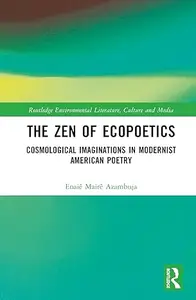 The Zen of Ecopoetics: Cosmological Imaginations in Modernist American Poetry
The Zen of Ecopoetics: Cosmological Imaginations in Modernist American Poetry
by Enaiê Mairê Azambuja
English | 2024 | ISBN: 1032415711 | 207 Pages | True PDF | 6.8 MB
This book is the first comprehensive study investigating the cultural affinities and resonances of Zen in early twentieth-century American poetry and its contribution to current definitions of ecopoetics, focusing on four key poets: William Carlos Williams, Marianne Moore, Wallace Stevens, and E.E. Cummings.
Bringing together a range of texts and perspectives and using an interdisciplinary approach that draws on Eastern and Western philosophies, including Zen and Taoism, posthumanism and new materialism, this book adds to and extends the field of ecocriticism into new debates. Its broad approach, informed by literary studies, ecocriticism, and religious studies, proposes the expansion of ecopoetics to include the relationship between poetic materiality and spirituality. It develops 'cosmopoetics' as a new literary-theoretical concept of the poetic imagination as a contemplative means to achieving a deeper understanding of the human interdependence with the non-human.
Addressing the critical gap between materialism and spirituality in modernist American poetry, The Zen of Ecopoetics promotes new forms of awareness and understanding about our relationship with non-human beings and environments. It will be of interest to scholars, researchers, and students in ecocriticism, literary theory, poetry, and religious studies.
Код:
Rapidgator
https://rg.to/file/d1d2556d4843fe5f100f3299afc8311d/kx1jk.7z.html
Fileaxa
https://fileaxa.com/v52v2e3obvm6/kx1jk.7z
Fikper
https://fikper.com/aHA0b6pf41/kx1jk.7z.html
Links are Interchangeable - Single Extraction
|

|

|
 22.08.2025, 08:25
22.08.2025, 08:25
|
#95042
|
|
Местный
Регистрация: 15.09.2024
Сообщений: 95,877
Сказал(а) спасибо: 0
Поблагодарили 3 раз(а) в 3 сообщениях
|
 The Zero-Click Revolution Strategies for Effortless Content Success
The Zero-Click Revolution Strategies for Effortless Content Success
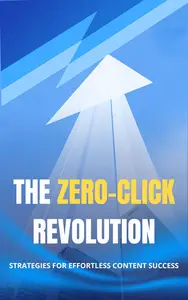 The Zero-Click Revolution: Strategies for Effortless Content Success by Arun Sharma
The Zero-Click Revolution: Strategies for Effortless Content Success by Arun Sharma
English | February 2, 2025 | ISBN: N/A | ASIN: B0DVT7TJ6J | 77 pages | EPUB | 1.46 Mb
Unlocking the Future of Search & Content Visibility
In the evolving landscape of digital marketing, zero-click searches are redefining how users access information. With Google prioritizing featured snippets, knowledge panels, and instant answers, traditional SEO strategies are no longer enough. The Zero-Click Revolution: Strategies for Effortless Content Success is your ultimate guide to thriving in a world where users get answers without clicking on search results.
This book unveils proven techniques to optimize content for zero-click searches, ensuring that your brand stays visible, authoritative, and influential-even when users don't visit your website.
What is the Zero-Click Revolution?
A zero-click search happens when users find the information they need directly on the search engine results page (SERP) without clicking through to a website. With the rise of Google's AI-driven features, these types of searches are increasing rapidly.
�� Featured Snippets - Google pulls content directly from websites and displays it in a highlighted box.
�� People Also Ask (PAA) - Related questions and quick answers that keep users engaged without clicking.
�� Knowledge Panels - Information sourced from authoritative databases and Wikipedia-like sources.
�� Instant Answer Boxes - Google provides definitions, statistics, and direct responses to common queries.
�� Voice Search & AI Assistants - Users get spoken answers via Siri, Google Assistant, and Alexa without visiting a site.
For content creators and businesses, this shift presents both challenges and opportunities. This book will show you how to adapt, optimize, and dominate zero-click searches to drive brand awareness, engagement, and conversions.
What You'll Learn in This Book
✅ Understanding Zero-Click SEO & How It Impacts Your StrategyThe rise of Google's AI-powered search and its effect on organic traffic.How SERP features like featured snippets, PAA, and Google Discover influence visibility.The future of search intent and AI-driven results.✅ How to Optimize Your Content for Zero-Click SearchesWriting concise, structured answers for featured snippets.Using schema markup & structured data to improve search rankings.Crafting FAQ-rich content that gets pulled into PAA boxes.Leveraging voice search optimization for AI assistants.✅ Alternative Traffic Strategies Beyond Google ClicksBranding & authority-building to stay top-of-mind.Using social media snippets & micro-content to engage audiences.Email marketing & community-driven platforms for direct traffic.✅ Case Studies & Real-World ExamplesHow top brands leverage zero-click strategies to maintain authority.Actionable insights from high-performing content creators.Why This Book Matters for Content Marketers & SEO Experts
With Google constantly evolving, traditional SEO tactics are no longer enough. If you want your content to stay visible and competitive, you must embrace the Zero-Click Revolution.
Код:
Rapidgator
https://rg.to/file/b41f196edcd489d302e101af5019b462/29i5a.7z.html
UploadCloud
https://www.uploadcloud.pro/tkw284qopw1h/29i5a.7z.html
Fileaxa
https://fileaxa.com/dnsihwrxrznj/29i5a.7z
Fikper
https://fikper.com/d9BEwvnsXY/29i5a.7z.html
Links are Interchangeable - Single Extraction
|

|

|
 22.08.2025, 08:29
22.08.2025, 08:29
|
#95043
|
|
Местный
Регистрация: 15.09.2024
Сообщений: 95,877
Сказал(а) спасибо: 0
Поблагодарили 3 раз(а) в 3 сообщениях
|
 The Zulu Principle Making Extraordinary Profits from Ordinary Shares
The Zulu Principle Making Extraordinary Profits from Ordinary Shares
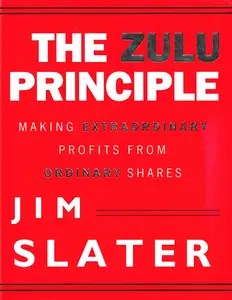 The Zulu Principle: Making Extraordinary Profits from Ordinary Shares by Jim Slater
The Zulu Principle: Making Extraordinary Profits from Ordinary Shares by Jim Slater
English | January 1, 1992 | ISBN: 1857970950 | 223 pages | PDF | 16 Mb
Book by Slater, Jim
Код:
Rapidgator
https://rg.to/file/5bd28c5b87b6e0cce925444eea5198e6/hfk8h.7z.html
UploadCloud
https://www.uploadcloud.pro/2aryodncxlni/hfk8h.7z.html
Fileaxa
https://fileaxa.com/uf8xql1f89r6/hfk8h.7z
Fikper
https://fikper.com/1DhTxGHGPh/hfk8h.7z.html
Links are Interchangeable - Single Extraction
|

|

|
 22.08.2025, 08:31
22.08.2025, 08:31
|
#95044
|
|
Местный
Регистрация: 15.09.2024
Сообщений: 95,877
Сказал(а) спасибо: 0
Поблагодарили 3 раз(а) в 3 сообщениях
|
 Their Accomplices Wore Robes How the Supreme Court Chained Black America to the Bo...
Their Accomplices Wore Robes How the Supreme Court Chained Black America to the Bo...
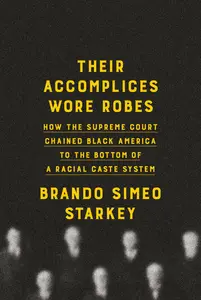 Their Accomplices Wore Robes: How the Supreme Court Chained Black America to the Bottom of a Racial Caste System by Brando Simeo Starkey
Their Accomplices Wore Robes: How the Supreme Court Chained Black America to the Bottom of a Racial Caste System by Brando Simeo Starkey
English | June 3rd, 2025 | ISBN: 0385547382 | 688 pages | True EPUB | 2.67 MB
A magisterial new history of the role of the Supreme Court as an ally in implementing and preserving a racial caste system in America
Their Accomplices Wore Robes takes readers from the Civil War era to the present and describes how the Supreme Court-even more than the presidency or Congress-aligned with the enemies of Black progress to undermine the promise of the Constitution's Thirteenth, Fourteenth, and Fifteenth Amendments.
The Reconstruction Amendments-which sought to abolish slavery, establish equal protection under the law, and protect voting rights-converted the Constitution into a potent anti-caste document. But in the years since, the Supreme Court has refused to allow the amendments to fulfill that promise. Time and again, when petitioned to make the nation's founding conceit-that all men are created equal-real for Black Americans, the nine black robes have chosen white supremacy over racial fairness.
Their Accomplices Wore Robes brings to life dozens of cases and their rich casts of characters-petitioners, attorneys, justices-to explain how America arrived at this point and how society might arrive somewhere better, even as today's federal courts lurch rightward. In this groundbreaking grand history, Brando Simeo Starkey reveals a troubling and dark aspect of American history.
Код:
Rapidgator
https://rg.to/file/331aa603800189a73d4381b3c7c8b7dc/hfke4.7z.html
UploadCloud
https://www.uploadcloud.pro/6q7s73p89p1w/hfke4.7z.html
Fileaxa
https://fileaxa.com/ec64fzbcb3ma/hfke4.7z
Fikper
https://fikper.com/nZzpidY4Jw/hfke4.7z.html
Links are Interchangeable - Single Extraction
|

|

|
 22.08.2025, 08:35
22.08.2025, 08:35
|
#95045
|
|
Местный
Регистрация: 15.09.2024
Сообщений: 95,877
Сказал(а) спасибо: 0
Поблагодарили 3 раз(а) в 3 сообщениях
|
 Theological Reflection for Human Flourishing Pastoral Practice and Political Theo...
Theological Reflection for Human Flourishing Pastoral Practice and Political Theo...
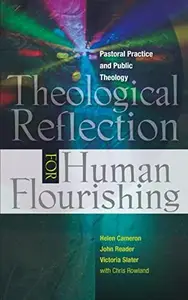 Theological Reflection for Human Flourishing : Pastoral Practice and Political Theology By Cameron Helen; John Reader; Victoria Slater; Chris Rowland
Theological Reflection for Human Flourishing : Pastoral Practice and Political Theology By Cameron Helen; John Reader; Victoria Slater; Chris Rowland
2015 | 156 Pages | ISBN: 0334043905 | PDF | 1 MB
Practical theology and theological reflection are growing areas of theological studies. This book aims to create a bridge between pastoral practice and public theology.
Код:
Rapidgator
https://rg.to/file/455186ea0c433ce47fbddc04e2457dd9/6czaj.7z.html
UploadCloud
https://www.uploadcloud.pro/ol3l5dm8tyxm/6czaj.7z.html
Fileaxa
https://fileaxa.com/hy7g21p4wvum/6czaj.7z
Fikper
https://fikper.com/oC9qRHHX2y/6czaj.7z.html
Links are Interchangeable - Single Extraction
|

|

|
 22.08.2025, 08:39
22.08.2025, 08:39
|
#95046
|
|
Местный
Регистрация: 15.09.2024
Сообщений: 95,877
Сказал(а) спасибо: 0
Поблагодарили 3 раз(а) в 3 сообщениях
|
 Theology as Repetition John MacQuarrie in Conversation
Theology as Repetition John MacQuarrie in Conversation
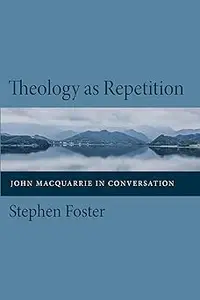 Stephen Foster, "Theology as Repetition: John MacQuarrie in Conversation"
Stephen Foster, "Theology as Repetition: John MacQuarrie in Conversation"
English | ISBN: 1532676948 | 2019 | 206 pages | EPUB | 886 KB
Theology as Repetition revisits and argues for a revival of John Macquarrie's philosophical theology. Macquarrie was a key twentieth-century theological voice and was considered a foremost interpreter and translator of Martin Heidegger's philosophy. He then somehow fell from view. Macquarrie developed a new style of theology, grounded in a dialectical phenomenology that is a relevant voice in responding to recent trends in theology. The development of the book is partly chronological and partly thematic, and avoids attempting to be either deductive or inductive in argument, but rather reflects Macquarrie's phenomenologically styled new theology. Theology as Repetition is set out in two parts. The first part situates Macquarrie in relation to thinkers from the radical theology of the 1960s through to the postmodernists of the late twentieth century. The second part explores the intersection of key themes in Macquarrie's theology with the thinking of Kant, Hegel, Heidegger, and representative postsecular and postmodern figures, including but not limited to Emmanuel Levinas, Jacques Derrida, and Jean-Luc Marion.
Read more
Код:
Rapidgator
https://rg.to/file/3b30404c915e36b56458cdbd25a9863c/womeq.7z.html
UploadCloud
https://www.uploadcloud.pro/62huuwvuk24b/womeq.7z.html
Fileaxa
https://fileaxa.com/hxwn3m7gjuv8/womeq.7z
Fikper
https://fikper.com/dYs9e3D1qX/womeq.7z.html
Links are Interchangeable - Single Extraction
|

|

|
 22.08.2025, 08:44
22.08.2025, 08:44
|
#95047
|
|
Местный
Регистрация: 15.09.2024
Сообщений: 95,877
Сказал(а) спасибо: 0
Поблагодарили 3 раз(а) в 3 сообщениях
|
 Thermo-Acoustics of Nanofluids and Transfer Processes (Emerging Materials and Tech...
Thermo-Acoustics of Nanofluids and Transfer Processes (Emerging Materials and Tech...
 Thermo-Acoustics of Nanofluids and Transfer Processes (Emerging Materials and Technologies) by Shriram S. Sonawane, Manjakuppam Malika
Thermo-Acoustics of Nanofluids and Transfer Processes (Emerging Materials and Technologies) by Shriram S. Sonawane, Manjakuppam Malika
English | March 17, 2025 | ISBN: 1032622911 | 200 pages | MOBI | 10 Mb
This book explains the physical principles and theoretical basis of acoustics of nanofluids with mathematical rigor, focusing on concepts and points of view that have proven effective in applications such as heat transfer, petroleum science and technology, wastewater treatment, food processing, and hydrogen production. It provides a rigorous framework to aid readers in building innovative nanofluid-based devices, covering essential topics such as the study and measurement of thermophysical characteristics, convection, and heat transfer equipment performance.
Features:Focuses on the basics of nanofluids, shedding light on the thermo-acoustic behaviorDiscusses the specific needs of a nanofluid for a process in terms of both heat and mass transferDiscusses the process transfer of nanofluids with reference to thermo-acousticsDiscusses the numerical and experimental investigations of nanofluids used in various fields of industrial applicationsReviews fundamentals and applied aspects of acoustic cavitationThis book is aimed at graduate students and researchers in fluid dynamics, nanotechnology, and chemical and mechanical engineering.
Код:
Rapidgator
https://rg.to/file/b4094eb70ad2bdcc03f8727edd81054a/n7bsh.7z.html
UploadCloud
https://www.uploadcloud.pro/fogf1cbx11yx/n7bsh.7z.html
Fileaxa
https://fileaxa.com/7aeb4ojqfp42/n7bsh.7z
Fikper
https://fikper.com/iniido0rn5/n7bsh.7z.html
Links are Interchangeable - Single Extraction
|

|

|
 22.08.2025, 09:08
22.08.2025, 09:08
|
#95048
|
|
Местный
Регистрация: 15.09.2024
Сообщений: 95,877
Сказал(а) спасибо: 0
Поблагодарили 3 раз(а) в 3 сообщениях
|
 Three Simple Questions Knowing the God of Love, Hope, and Purpose
Three Simple Questions Knowing the God of Love, Hope, and Purpose
 Three Simple Questions : Knowing the God of Love, Hope, and Purpose By Rueben P. Job
Three Simple Questions : Knowing the God of Love, Hope, and Purpose By Rueben P. Job
2011 | 83 Pages | ISBN: 1426741545 | EPUB | 1 MB
Rueben P. Job, author of Three Simple Rules, brings us a new insight on how to live a Christ-like life and explores the three most basic and profound questions at the center of our faith--questions that all major religions try to answer and around which there seems to be much confusion: Who is God? Who am I? Who are we together? In three brief and engaging chapters, readers will explore these questions and gain new understanding of the answers: Know that God is greater than you can imagine Believe that you are God's beloved child Be the love of Christ in the world They will also discover the greatness and goodness of God, the value of every beloved child of God, and the impact we can have in the world when we live as Jesus lived. Each chapter concludes with a simple spiritual practice to help readers remember and respond to what they have read, followed by a prayer. Now it is time for you to know, believe and become the answers. In its first paragraphs, Three Simple Questions triggered my hunger for hope. I hung on each word thereafter. By the time I finished my reading, I was filled to overflowing. I was drawn deeper by the notion of a God too small. Prayer as the place where we receive our identity was profound. I cheered with the truth that God loves all. I was intrigued by the imagery of my being a "holy chalice." The three daily practices are refreshing and engaging. In short, the read filled me with grace. --Bishop Sharon Brown Christopher
Код:
Rapidgator
https://rg.to/file/94dd31abea8d6805b6bcf9303b4e9cf9/34y1q.7z.html
Fileaxa
https://fileaxa.com/7z44cqta8zh7/34y1q.7z
Fikper
https://fikper.com/ClYoHJqVCL/34y1q.7z.html
Links are Interchangeable - Single Extraction
|

|

|
 22.08.2025, 09:10
22.08.2025, 09:10
|
#95049
|
|
Местный
Регистрация: 15.09.2024
Сообщений: 95,877
Сказал(а) спасибо: 0
Поблагодарили 3 раз(а) в 3 сообщениях
|
 Three Simple Rules A Wesleyan Way of Living
Three Simple Rules A Wesleyan Way of Living
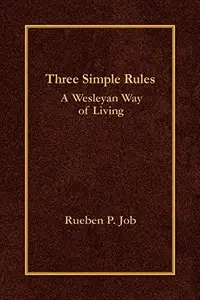 Three Simple Rules : A Wesleyan Way of Living By Rueben P. Job
Three Simple Rules : A Wesleyan Way of Living By Rueben P. Job
2007 | 78 Pages | ISBN: 0687649668 | EPUB | 1 MB
In Three Simple Rules, Rueben Job offers an interpretation of John Wesley's General Rules for today's readers. For individual reading or group study, this insightful work calls us to mutual respect, unity and a deeper daily relationship with God. This simple but challenging look at three commands, "do no harm, do good, stay in love with God," calls us to mutual respect, unity, and a deeper relationship with God. "Every year I review the three general rules of the United Methodist Church with those who are being ordained. Now I have a wonderful ordination gift to give them in Bishop Job's, Three Simple Rules, to start and deepen the conversation as they enter a new relationship with the church. Bishop Job has described "by attending upon all the ordinances of God" to be to "stay in love with God." It's a fresh language that speaks especially to long-time Christians and United Methodists." Sally Dyck, Resident Bishop, Minnesota Area "Three Simple Rules is a new catechism for everyone wanting to follow Jesus Christ. These practices for holy living should replace the membership vows in every church Don't let the title fool you. Bishop Job writes, 'The rules are simple, but the way is not easy. Only those with great courage will attempt it, and only those with great faith will be able to walk this exciting and demanding way.'" John Hopkins, Resident Bishop, East Ohio Area Table of Contents: Introduction The World In Which We Live First Do No Harm Do All the Good You Can Stay in Love with God A Guide for Daily Prayer
Код:
Rapidgator
https://rg.to/file/004aa327cbbf0ac4ab7e7bbac08d022b/f6rh2.7z.html
UploadCloud
https://www.uploadcloud.pro/gzki7n08orou/f6rh2.7z.html
Fileaxa
https://fileaxa.com/g5ubx2l87gdv/f6rh2.7z
Fikper
https://fikper.com/TkuQGIhJlM/f6rh2.7z.html
Links are Interchangeable - Single Extraction
|

|

|
 22.08.2025, 09:11
22.08.2025, 09:11
|
#95050
|
|
Местный
Регистрация: 15.09.2024
Сообщений: 95,877
Сказал(а) спасибо: 0
Поблагодарили 3 раз(а) в 3 сообщениях
|
 Thrice Told Tales Married Couples Tell Their Stories
Thrice Told Tales Married Couples Tell Their Stories
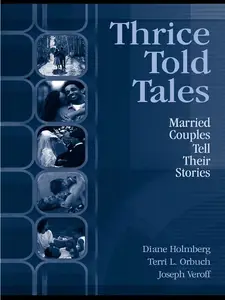 Thrice Told Tales : Married Couples Tell Their Stories By Diane Holmberg; Terri L. Orbuch; Joseph Veroff
Thrice Told Tales : Married Couples Tell Their Stories By Diane Holmberg; Terri L. Orbuch; Joseph Veroff
2003 | 246 Pages | ISBN: 0805840990 | EPUB | 1 MB
Researchers have studied marriage for decades, but how is the transition to married life actually experienced by the couples involved? From an insider's perspective, Thrice Told Tales examines married couples' own stories of their relationship. A representative sample of 199 African-American and 177 White married couples were asked to tell the story of their relationship. It provides accounts of courtships, weddings, honeymoons, their adjustment in the early years, and hopes for the future. These stories were first collected a few months after their weddings, and again in the third and seventh years of their marriages. What features of their relationship do the couples highlight as central in the early years? How do their stories change over time? What can we learn about couples' marital well-being by analyzing their stories? How do the stories of men and women, and of White and African-American couples differ? These questions were systematically addressed using extensive coding schemes and comprehensive quantitative analyses. Details of the coding system and procedures are included, making this volume a useful reference for any researcher contemplating analysis of narrative data. However, the key points are also explained in simple prose and illustrated with quotes from the couples' own stories, making the book accessible to anyone with an interest in how young couples experience married life today.
Код:
Rapidgator
https://rg.to/file/3b31c7f8a108d4e1c309f8136cc523c9/gwaqw.7z.html
Fileaxa
https://fileaxa.com/y7ynm3pgs2c3/gwaqw.7z
Fikper
https://fikper.com/lgej0R9OFK/gwaqw.7z.html
Links are Interchangeable - Single Extraction
|

|

|
 22.08.2025, 09:13
22.08.2025, 09:13
|
#95051
|
|
Местный
Регистрация: 15.09.2024
Сообщений: 95,877
Сказал(а) спасибо: 0
Поблагодарили 3 раз(а) в 3 сообщениях
|
 Tiergestützte Therapie mit Hunden, 2.Auflage
Tiergestützte Therapie mit Hunden, 2.Auflage
 Tiergestützte Therapie mit Hunden: Grundlagen, Tierethik und Praxis der therapeutischen Arbeit
Tiergestützte Therapie mit Hunden: Grundlagen, Tierethik und Praxis der therapeutischen Arbeit
Deutsch | 2025 | ISBN: 3662708558 | 179 Pages | PDF (True) | 13 MB
Die tiergestützte Therapie ist seit einigen Jahren in aller Munde und wird immer häufiger auch in die psychotherapeutische Behandlung von Menschen integriert. Doch wie genau können Therapiebegleithunde die psychotherapeutische Arbeit erweitern und unterstützen? Wie lassen sich dabei Tierschutz und Menschenwohl vereinen? Welche Hunde eignen sich für den Einsatz als Therapiebegleithund und wie werden sie auf ihren Einsatz vorbereitet?
Код:
Rapidgator
https://rg.to/file/569d83a5622028bed6a6033297b91000/85ltz.7z.html
UploadCloud
https://www.uploadcloud.pro/l5agd0py1aus/85ltz.7z.html
Fileaxa
https://fileaxa.com/cc4w2gqpmvr6/85ltz.7z
Fikper
https://fikper.com/Wf4LjEPNKy/85ltz.7z.html
Links are Interchangeable - Single Extraction
|

|

|
 22.08.2025, 09:14
22.08.2025, 09:14
|
#95052
|
|
Местный
Регистрация: 15.09.2024
Сообщений: 95,877
Сказал(а) спасибо: 0
Поблагодарили 3 раз(а) в 3 сообщениях
|
 Timescapes in Management Creative Enquiries and Critical Examinations
Timescapes in Management Creative Enquiries and Critical Examinations
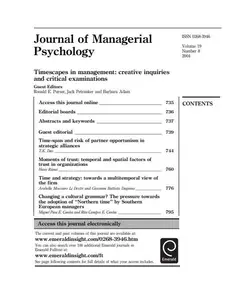 Timescapes in Management : Creative Enquiries and Critical Examinations By Ronald E. Purser; Barbara Adam; Jack Petranker
Timescapes in Management : Creative Enquiries and Critical Examinations By Ronald E. Purser; Barbara Adam; Jack Petranker
2004 | 110 Pages | ISBN: 1845442245 | PDF | 1 MB
Time has been referred to as the hidden dimension (Hall, 1983), an implicit challenge that for many years went largely unanswered in the field of management studies. A few pioneers explored aspects of temporality in organizational studies (for an excellent review see Bluedorn, 2002; Das, 1986), but for the most part the discipline seemed content to go along with unexamined assumptions and peremptory conclusions. Perhaps the dawn of the new millennium has had something to do with it, but this era of neglect shows signs of coming to an end. Future theorists may mark the turning point as the annual conference of the Academy of Management held in Toronto in 2000, which took time as its theme. Thousands of academics and practitioners found themselves confronting hundreds of papers on the theme of time, and some came away with a sense of new ideas stirring. Following the conference, a special issue of the Academy of Management Review took up the theme of time as a research lens in organizations (Anconna et al, 2001). One of the sessions organized for the 2000 AOM Conference featured presentations by all three of the editors for this special issue of JMP. Organized by Ronald Purser in his capacity as Chair of the Organizational Development and Change Division of the AOM, the All-Academy session challenged organizational scholars to be more reflexive in their theorizing of time. The theme for the session was Barbara Adam's notion of "timescapes," which decenters linear, objectivist conceptions of time, opening discourse to temporal modes that are normally ignored or marginalized (Adam, 1998). In 2002, the three of us joined forces with a number of well-known scholars in the field to organize a small conference (about 20 participants) devoted to the theme of time. The conference title was "Dynamic time and creative inquiry in organizational change." Precisely because time was the theme, we focused in on the time that conferees would spend together, and determined to depart from the usual conference format in several key respects. First, we required all presenters to make their papers available in advance on the website of the Center for Creative Inquiry (interested readers can find them at [Ссылки доступны только зарегистрированным пользователям
. Регистрируйся тут...]). Equally important, we asked them to submit short biographical statements and a photo. The site provided for exchanges on the papers, as well as on the design of the conference. These innovations, though relatively minor, had a tremendous impact on the conference. By the time participants gathered at a secluded site in Essex, MA, they shared a history. Though most of us had never met, we knew something about each other, and we had all already taken an active role in preparing for the conference. To build on this promising beginning, the conference organizers announced that this would be an "improvisational conference." Although we established a structure intended to make sure that everyone would have a chance to present, we also agreed that we would feel free to modify that structure as we went along. On a micro-level, we asked participants to find ways to make their presentations more dynamic and improvisational. A few of the presenters took improvisation as their overt theme, but our aim was to have everyone share in the sense that we would be laying down our path as we walked it. At the very least, we reasoned, this commitment would make us more aware of the temporal dimension, since we would be confronting it at every turn-not in the usual mode of deadlines and tight schedules, but as an arena of open possibilities. The results were gratifying. No one wandering into the event would have mistaken it for a rave, but the participants seemed to share a sense of greater freedom and more meaningful exchanges. As one of us (Purser) had said in advance of the conference, at most conferences the most fruitful parts take place in the hallways between events; we were aiming for a conference that was "all hallways." We surely fell short, but it was a good beginning. The present issue of JMP grows directly out of the Essex conference. Our original thought was that we would look for a forum to publish some of the papers that grew out of the conference, but as we thought it through, we realized it would be more fruitful - and more true to the theme of time as indeterminate - to invite contributions through a more traditional call for papers. We solicited contributions that could help "spark a creative inquiry into the multiplicity of temporalities that constitute managerial experience and organizational life," and urged a transdisciplinary approach. The articles published here were selected from the many contributions we received in response. The papers collected here can be read individually as contributions to the field of management psychology that break new ground by introducing or exploring in new ways the multi-faceted timescapes within which organizational actors work, plan, and contrive to succeed. They can also be read as contributions to an ongoing dialogue that aims to rethink time at a deep level. Our sense is that the temporal dimension as it is presently understood imposes limits on the possibilities for organizations, management, and managers - limits that we will begin to recognize more clearly only when we are on the way to overcoming them. In this broader sense, readers may want to read the articles in this special issue in light of one another. It would be foolish to impose an artificial unity on a collection of papers submitted by authors with widely differing concerns and backgrounds. Yet there are themes and approaches that carry across papers, so that each illuminates the others. Here we will trace one pathway through the collection, certain that others will find other, equally fruitful approaches. We begin with the article by T.K. Das, truly a pioneer in the field of temporal studies. His concern here is with the temporalities of opportunism: those situations in which a partner in a strategic alliance deliberately undermines that alliance for the sake of private advantage. Das assesses the conditions that make opportunism more or less like in terms of the temporal horizon (short-term or long-term) of possible opportunistic action, Descriptionted against the degree of risk to the relationship that such an action will engender. The underlying issue here is one of identity: a business that enters a strategic alliance maintains its own identity intact, and thus can contemplate betraying the alliance without having to rethink its own image and commitments. Noteworthy about this analysis is that it takes the "standard" understanding of time for granted. Managers take actions now to get desired results in the future. In the logic appropriate to such a linear approach, opportunistic acts are always an option. The article by Ramos investigates the theme of trust, closely related to the issue of opportunism that concerns Das. However, he does so from a very different perspective. Ramos starts from the idea that existing timescapes lead to "excessive stress, unoriginality and even distrust," and aims to sketch out an alternative. Focusing on the distinction between chronos (conventional linear time) and kairos (the right time, the time for appropriate action), he suggests that management could approach decisions in ways that invited the application of wisdom and judgment rather than simply good results. For Ramos, opportunism could never be "timely" in a kairotic sense; as he writes, a "partisan focus on organizational goals will never be reconcilable with trust". This framework raises a number of important questions. Must one possess wisdom in order to act in a "timely" manner? If so, how shall such wisdom arise? Could a different approach to time itself lead to wisdom, and could such wisdom inform a different management ethos? Ramos rightly points out that due to external constraints, few managers will realistically be able to pursue such a possibility. Still, an important question has been raised. A different approach to time requires a different kind of knowledge, but what if the different knowledge in question is the knowledge of time? Perhaps the very act of naming and exploring kairos is a step toward such knowledge, and hence a step toward wisdom. With Li Destri and Dagnino, we return to a more conventional (though multiple) understanding of time. The authors contrast objective, Newtonian, linear time, in which all moments are homogeneous, with subjective, Bergsonian, qualitative time, in which each moment is uniquely conditioned by the web of memory and anticipation in which it arises. They link the former to classic economic rationalism, which reasons probabilistically from past patterns to future likelihoods, while they associate the latter with the entrepreneurial spark that reacts to the uncertainty of the future with creative solutions. Drawing on the Austrian process view, they suggest that each of these approaches has application at different times in the life cycle of an organization, and on this basis suggest that a focus on different kinds of temporality might make it possible to build a bridge between entrepreneurial studies and strategic management. Interestingly, the Bergsonian approach introduced in this article is not difficult to reconcile with the more conventional temporal analysis presupposed in Das, for opportunism anticipates what is possible in the unique circumstances and conditions of this precise moment, and in this sense is entrepreneurial. Perhaps the reason for this congeniality is that subjective approaches to time, like objective approaches, are founded in identity, and thus extend themselves across time in characteristic ways. Like Li Destri and Dagnino, the E Cunhas distinguish two kinds of time. In their case these are monochronic time, as practiced in northern Europe, and polychronic time, as practiced in southern Europe. There is a tendency to regard these two modes of time (originally identified by Hall) as akin to objective and subjective time, but the E Cunhas reject this comparison. Instead, they contend that polychronic time focuses on relationships rather than results; in another formulation, they suggest that it is maternal rather than paternal. The E Cunhas buttress these conclusions with references to an empirical study of eighty Portuguese managers and their difficulties in integrating the values learned in a polychromic society into an increasingly monochronic world economic order. Perhaps we could speak here of another kind of identity: not the objective identity of the organization or the subjective identity of the individual actor, but the relational identity that arises in community, giving rise to its own temporality. The interplay of subjective time, identity, and the temporal structures that shape the world of management also figures prominently in the article by Sharon Turnbull. The study on which this paper is based looked at senior managers nearing the age of retirement in a large public-sector organization going through significant changes. Accustomed to viewing their own careers as describing a linear trajectory through time, the study participants found themselves strangely at a loss when they reached a point where, their careers nearing an end, this model no longer held. In effect, they were forced to confront the existential question of how the reality of death (translated into the corporate realm as retirement) figures into the subjective experience of time. Turnbull's discussion of this and related points helps clarify that subjective reactions to socially constituted temporal structures are often inseparable from those structures, which take on an "objective" life of their own. For the executives she studied, the unexpected disjunction between the subjective and objective left them in a state of temporal anxiety, struggling to fit their identities into alternative temporal modalities. The final article, by Sierk Ybema, is wholly at home in the realm of the subjective. Drawing an analogy to studies of organizational nostalgia, Ybema identifies an approach to the future that he calls "postalgia": a way of framing a common destiny meant simultaneously to unite, to exclude, and to determine who shall hold power. He is explicit about the emotional component of this approach to time, reminding us that the "algia" in postalgia comes from a word meaning "grief" or "distress." If Ybema, like the E Cunhas, throws us squarely into the middle of a world (and corresponding timescape) centered on group identity, he also suggests a way out. The kind of time on which he focuses is related to the telling of stories. Could the story could be told differently? Would it perhaps be possible to engage time in a way that told no stories at all? If that happened, we would not be thrown back on the rational timescape of the economic decision-maker (for as Ybema notes, economic rationality is its own kind of story, perhaps a story at one remove from psychological realities). Instead, we might be in touch with a different dimension of time. Instead of competing for ownership of the present through nostalgic or postalgic accounts, we might be able simply to accept the present, and with it the past and the future. Could that approach relieve our grief and distress? Could this way of relating to time open the gate to wisdom? Time will tell. Ronald E. Purser, Jack Petranker and Barbara Adam Guest Editors Previously published in: Journal of Managerial Psychology, Volume 19, Number 8, 2004
Код:
Rapidgator
https://rg.to/file/e5f7b097f86e37436b27a1fe3aa987b6/a8oxa.7z.html
Fileaxa
https://fileaxa.com/yo5y725i060r/a8oxa.7z
Fikper
https://fikper.com/kbzyDnC3VN/a8oxa.7z.html
Links are Interchangeable - Single Extraction
|

|

|
 22.08.2025, 09:16
22.08.2025, 09:16
|
#95053
|
|
Местный
Регистрация: 15.09.2024
Сообщений: 95,877
Сказал(а) спасибо: 0
Поблагодарили 3 раз(а) в 3 сообщениях
|
 Tip of the Tongue States
Tip of the Tongue States
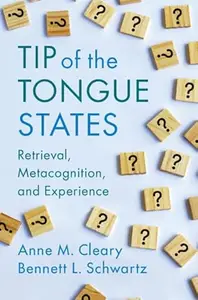 Tip of the Tongue States: Retrieval, Metacognition, and Experience
Tip of the Tongue States: Retrieval, Metacognition, and Experience
English | 2025 | ISBN: 1009372033 | 263 Pages | PDF | 2 MB
The tip-of-the-tongue state-the feeling that something that we cannot recall is close to coming to mind-is a window onto many facets of the human mind. It lies at an intersection where memory mechanisms, language processes, attention, metacognition, conscious awareness, goal-driven behaviours, curiosity, and even decision-making and risk-taking all seem to cross. In this book, Anne Cleary and Bennett Schwartz explain how tip-of-the-tongue states fit into our overall cognitive systems and what they tell us about the nature of cognition and consciousness. The tip-of-the-tongue state can wield enormous power over our attentional focus and what we choose to do next, regardless of what we had been doing before the onset of the feeling. In short, it wields the ability to redirect our mind. Cleary and Schwartz's text will appeal to students and researchers interested in the workings of the mind and brain.
Код:
Rapidgator
https://rg.to/file/a62011d7ea718cd5e30dd1e65612965c/l8uhr.7z.html
UploadCloud
https://www.uploadcloud.pro/ockn1i0o92dx/l8uhr.7z.html
Fileaxa
https://fileaxa.com/qcdo5vqamovf/l8uhr.7z
Fikper
https://fikper.com/SKjT9F38DD/l8uhr.7z.html
Links are Interchangeable - Single Extraction
|

|

|
 22.08.2025, 09:18
22.08.2025, 09:18
|
#95054
|
|
Местный
Регистрация: 15.09.2024
Сообщений: 95,877
Сказал(а) спасибо: 0
Поблагодарили 3 раз(а) в 3 сообщениях
|
 Titans of Industrial Agriculture How a Few Giant Corporations Came to Dominate the...
Titans of Industrial Agriculture How a Few Giant Corporations Came to Dominate the...
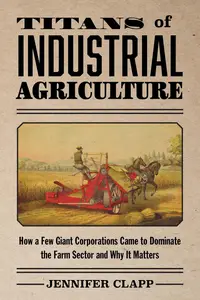 Titans of Industrial Agriculture: How a Few Giant Corporations Came to Dominate the Farm Sector and Why It Matters (One Planet) by Jennifer Clapp
Titans of Industrial Agriculture: How a Few Giant Corporations Came to Dominate the Farm Sector and Why It Matters (One Planet) by Jennifer Clapp
English | February 18, 2025 | ISBN: 0262551705 | 474 pages | PDF | 9.11 Mb
How a small handful of giant transnational corporations has come to dominate the farm inputs sector, why it matters, and what can be done about it.
Every year, hundreds of billions of dollars' worth of farm machinery, fertilizer, seeds, and pesticides are sold to farmers around the world. Although agricultural inputs are a huge sector of the global economy, the lion's share of that market is controlled by a relatively small number of very large transnational corporations. The high degree of concentration among these agribusiness titans is striking, considering that just a few hundred years ago agricultural inputs were not even marketed goods. In Titans of Industrial Agriculture, Jennifer Clapp explains how we got from there to here, outlining the forces that enabled this extreme concentration of power and the entrenchment of industrial agriculture.
Clapp reveals that the firms that rose to the top of these sectors benefited from distinct market, technology, and policy advantages dating back a century or more that enabled them to expand their businesses through mergers and acquisitions that made them even bigger and more powerful. These dynamics matter because the firms at the top have long shaped industrial farming practices that, in turn, have generated enormous social, ecological, and health impacts on the planet and the future of food systems. Beyond analyzing how these problems have arisen and manifested, the book examines recent efforts to address corporate power and dominance in food systems and assesses the prospects for change.
Among the first works to examine deep roots of corporate power in agriculture, Titans of Industrial Agriculture helps illuminate just how corporate actors have encouraged the "lock-in" of industrial agriculture, despite all its known social and ecological costs.
Код:
Rapidgator
https://rg.to/file/ff622114076366a42c3fefd9f5e05759/csyv9.7z.html
UploadCloud
https://www.uploadcloud.pro/n5n2lvv36oq0/csyv9.7z.html
Fileaxa
https://fileaxa.com/cxwd7rl5xpts/csyv9.7z
Fikper
https://fikper.com/G0Xh0Cc38H/csyv9.7z.html
Links are Interchangeable - Single Extraction
|

|

|
 22.08.2025, 09:20
22.08.2025, 09:20
|
#95055
|
|
Местный
Регистрация: 15.09.2024
Сообщений: 95,877
Сказал(а) спасибо: 0
Поблагодарили 3 раз(а) в 3 сообщениях
|
 Titles and Forms of Address A Guide to Correct Use
Titles and Forms of Address A Guide to Correct Use
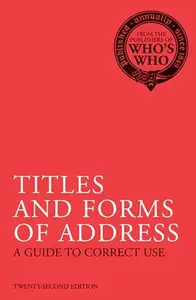 Titles and Forms of Address: A Guide to Correct Use By
Titles and Forms of Address: A Guide to Correct Use By
2008 | 241 Pages | ISBN: 0713683252 | PDF | 1 MB
A guide to correct forms of address in speech and correspondence. Itcovers both formal and social occasions, and includes the forms ofaddress for bishops, peers, privy counsellors, ambassadors, JPs andmayors. This edition is updated to cover changing conventions.
Код:
Rapidgator
https://rg.to/file/4aae163f5270fbe20c53a8ed4ff28e35/seml3.7z.html
Fileaxa
https://fileaxa.com/es5igbjsxca6/seml3.7z
Fikper
https://fikper.com/RbS0wUlat5/seml3.7z.html
Links are Interchangeable - Single Extraction
|

|

|
    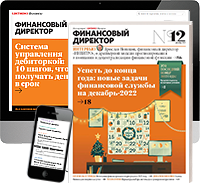  
Любые журналы Актион-МЦФЭР регулярно !!! Пишите https://www.nado.in/private.php?do=newpm&u=12191 или на электронный адрес pantera@nado.ws
|
Здесь присутствуют: 3 (пользователей: 0 , гостей: 3)
|
|
|
 Ваши права в разделе
Ваши права в разделе
|
Вы не можете создавать новые темы
Вы не можете отвечать в темах
Вы не можете прикреплять вложения
Вы не можете редактировать свои сообщения
HTML код Выкл.
|
|
|
Текущее время: 00:22. Часовой пояс GMT +1.
| |